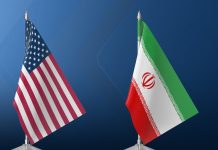TASHKENT: Uzbekistan considers cooperation with the Caspian states as one of the priority directions of its foreign policy strategy, Head of the Department of the Institute for Strategic and Interregional Studies under the President of Uzbekistan Farrukh Zhuraev said.
According to the information, at the end of 2019, Uzbekistan’s foreign trade turnover amounted to $42.2 billion. However, amid COVID-19 pandemic crisis in 2020, this indicator decreased by 13.1 percent (compared to 2019) – to $36.3 billion At the same time, according to ADB (Asian Development Bank) forecasts, in 2021 GDP growth will amount to 5.8 percent, as reforms will stimulate growth in agriculture, industry and services. The experts from Boston Consulting Group said Uzbekistan occupies a strategic location in Central Asia and has a developed transport infrastructure. In their opinion, in the next ten years, the investment potential of Uzbekistan will amount to $65 billion, of which up to $20 billion will be spent on non-resource industries.
Farrukh Zhuraev noted that the “Strategy for the development of the transport system of Uzbekistan until 2035” is currently being developed, which provides for the creation of conditions for the growth of volumes and quality of passenger and freight traffic, improvement of the transport sector management system, as well as the introduction of fundamentally new approaches to training, retraining and advanced training of workers transport system.
In addition, the main priorities of Uzbekistan in the development of transport corridors in Central Asia, President of Uzbekistan Shavkat Mirziyoyev identified the implementation of transport and communication projects that will connect Central Asia with the largest seaports and world markets, the formation of a trans-Afghan corridor with access to South Asia, the construction of the China-Kyrgyzstan railway – Uzbekistan, as well as further development of transit potential and increase in the transport component in the national economy.
Also, in recent years, road, aviation and rail links with Afghanistan, Kazakhstan, Kyrgyzstan, Tajikistan and Turkmenistan have been actively developing. In particular, work on the construction of the Uzbekistan-Kyrgyzstan-China railway has been intensified. The project is intended to become an important link in the regional transport network within the framework of the East-West and North-South projects, providing access to international seaports for the geographically closed states of Central Asia. – Agencies





